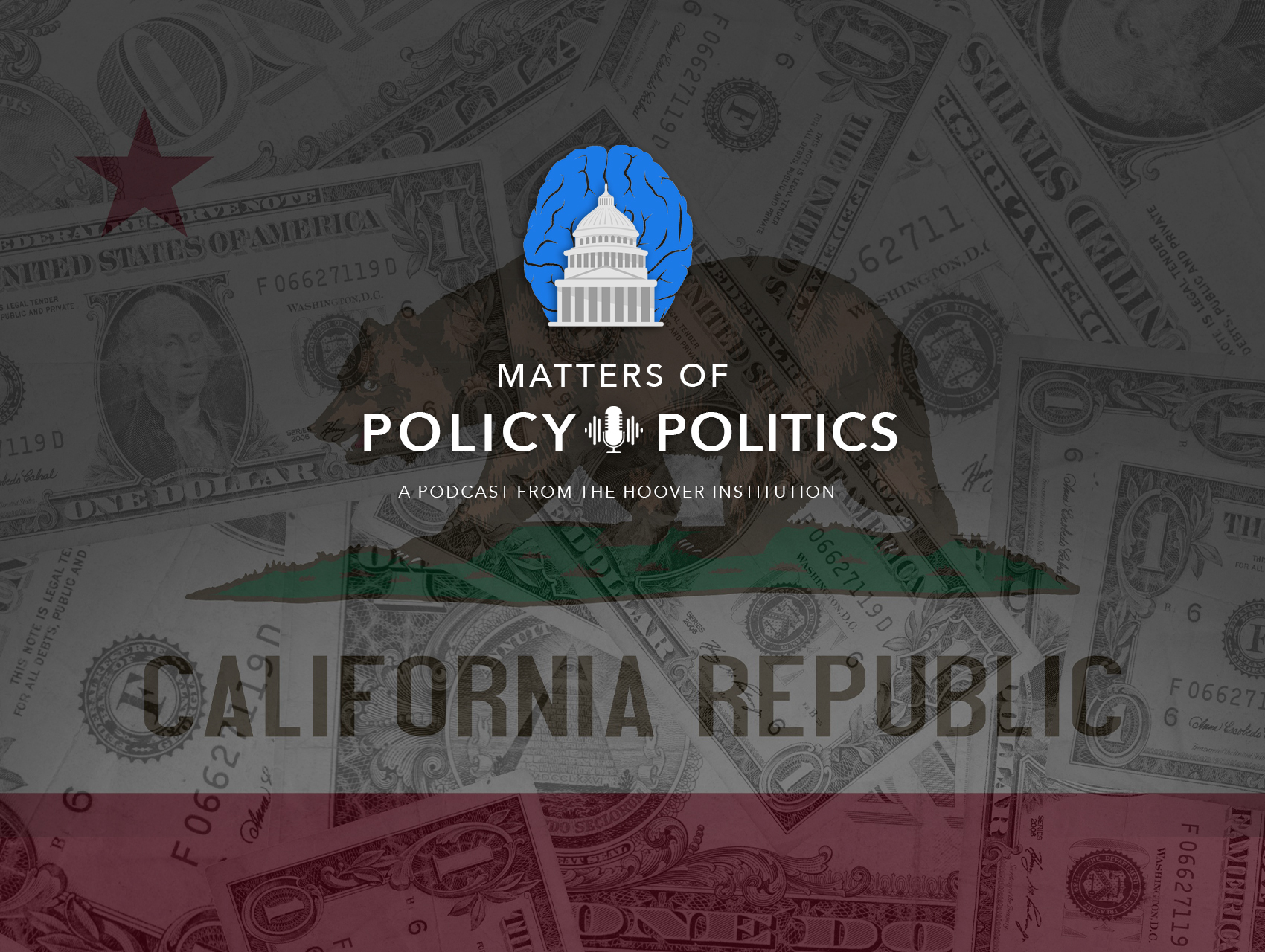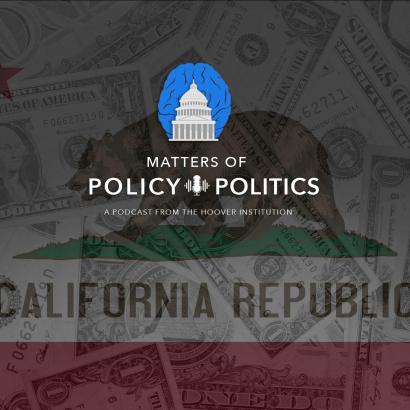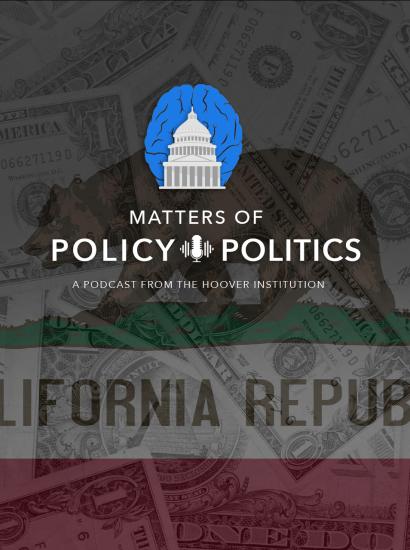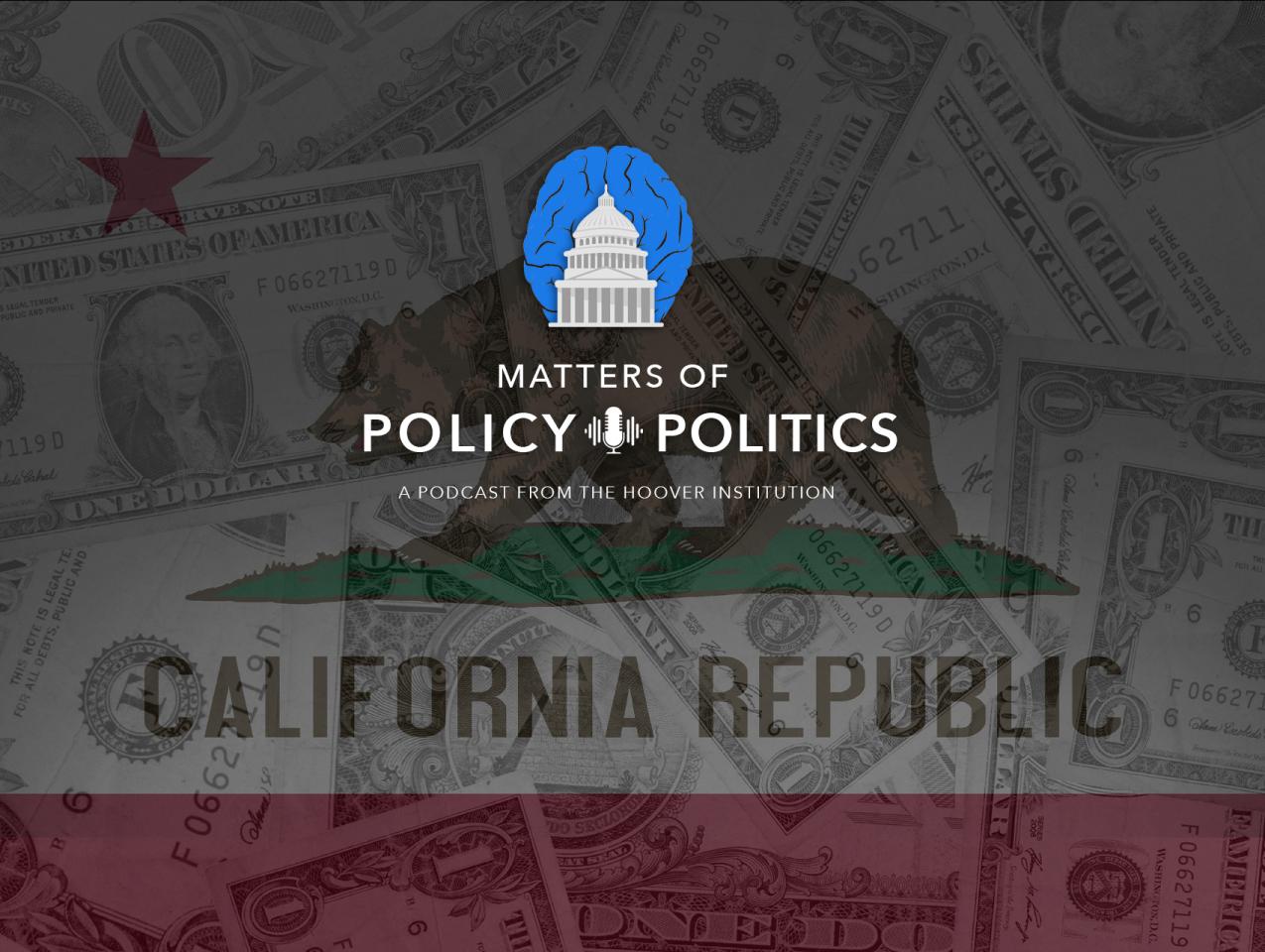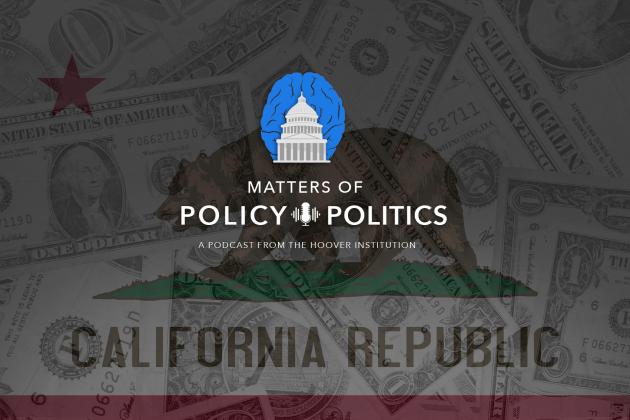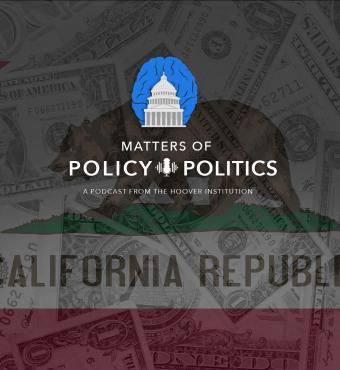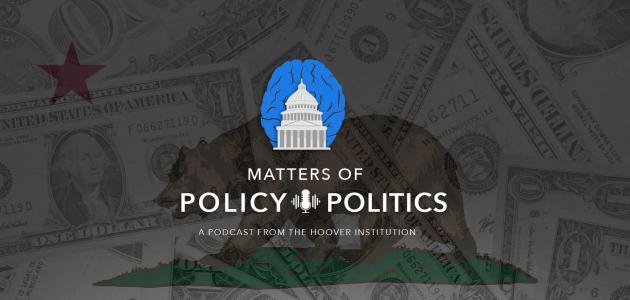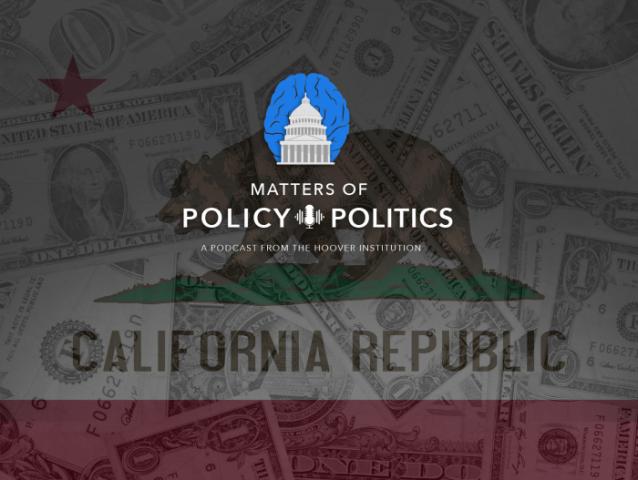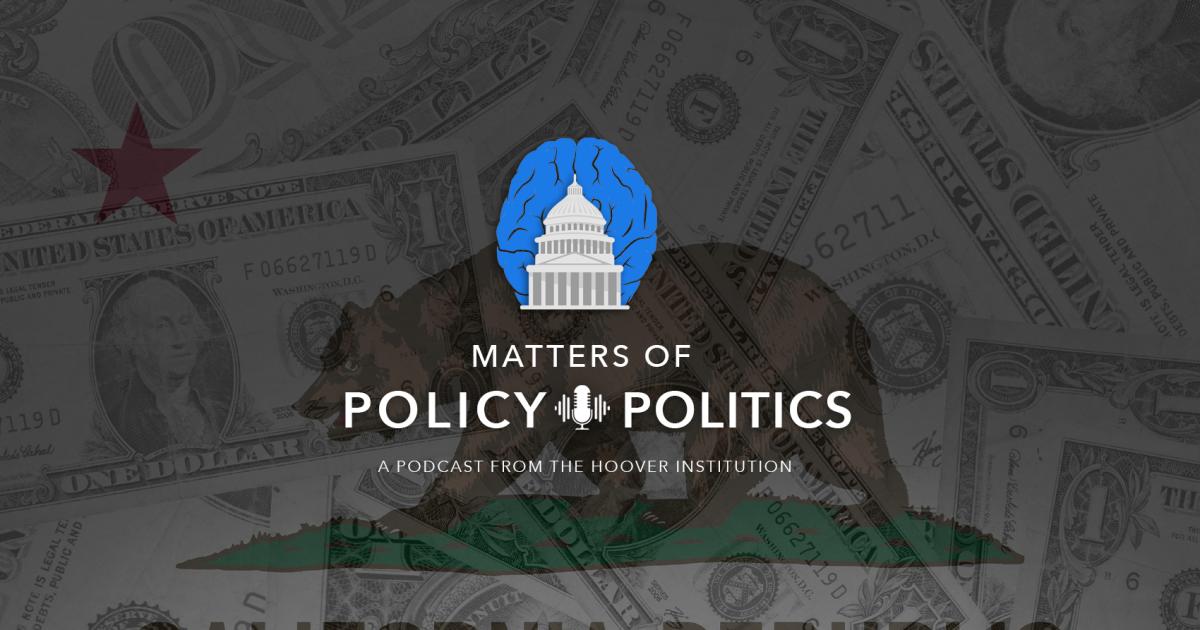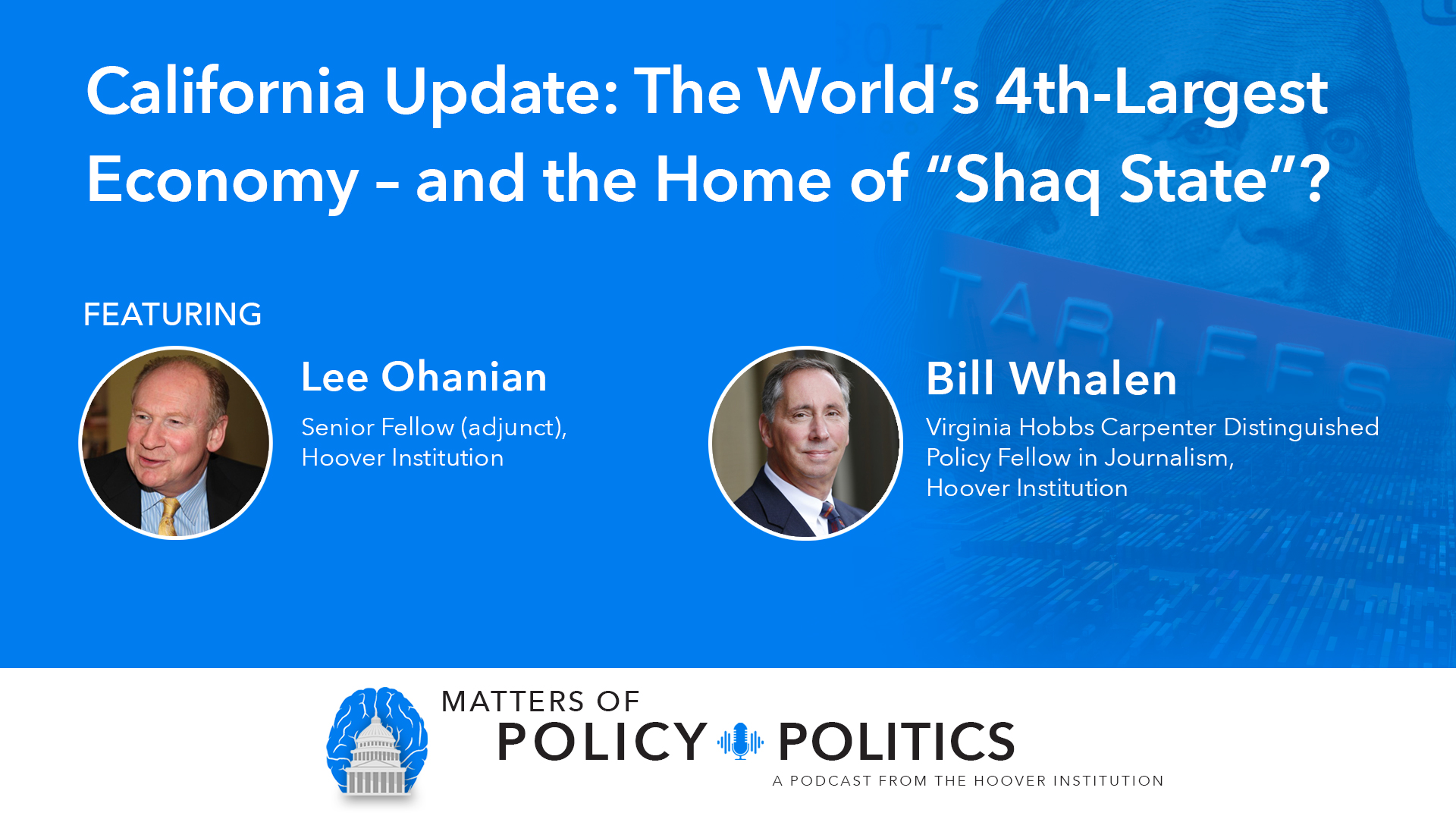- State & Local
- Politics, Institutions, and Public Opinion
- Empowering State and Local Governance
New data points to California as the world’s fourth-largest economy, supplanting Japan (with India likely soon surpassing the Golden State). What does that say about California as an economic powerhouse and a nation-state plagued by a dark economic underside (inflation, high cost of living, middle-class squeeze)?
Hoover senior fellow Lee Ohanian and distinguished policy fellow Bill Whalen, both contributors to Hoover’s California on Your Mind web channel, join Hoover’s assistant director of content development Jonathan Movroydis to discuss California’s new global standing, the impact of looming Trump tariffs, the reemergence of former vice president Kamala Harris as she ponders whether to run for governor in 2026, political intrigue past, present, and future in Los Angeles, the ongoing struggles of California’s high-speed rail project, plus basketball great Shaquille O’Neal becoming the general manager of Sacramento State’s men’s basketball team – and whether state government likewise could benefit from a star athlete’s intervention.
Recorded on May 1, 2025.
WATCH TO THE EPISODE
>> Jonathan Movroydis: It's Thursday, May 1, 2025 and you are listening to matters of policy and politics at Hoover Institution podcast devoted governance and balance of power here in America and around the free world. I'm Jonathan Movroydis of the Hoover Institution. I'm sitting in the chair of Bill Whalen, the Virginia Hobbs Carpenter Distinguished Policy and Fellow in Journalism, so that he can answer questions and provide commentary about California policy and politics in which he is well versed.
Bill Whalen, in addition to being a Washington Post columnist, writes weekly for Hoover's California on your Mind web channel. Whalen is joined today by Lee Ohanian, Hoover Institution Senior Fellow and Professor of Economics and Director of the Edinger Family Program in Macroeconomic Research at the University of California, Los Angeles.
Ohanian also writes weekly about the policy environment of the Golden State for California on Your Mind. Good day. How are you guys doing today?
>> Bill Whalen: Good, thanks. Happy meeting.
>> Lee Ohanian: Yeah, doing well.
>> Jonathan Movroydis: Gentlemen, let's jump right into it. Governor Newsom has a new talking point. According to data from the International Monetary fund and the U.S bureau of Economic Analysis, California has supplanted Japan as the world's fourth largest economy.
Newsom boasts that quote, california isn't just keeping pace with the world, we're setting the pace. California's economy grew by 6%, outpacing growth rates of the U.S. china and Germany. Newsom's economic management has been a subject of criticism on this podcast, as well as swarms of individuals and businesses who have left the state in the post Covid era.
Lee have those criticisms now been dispelled by Newsom, who has underscored California's new economic world standing?
>> Lee Ohanian: Jonathan, so that data got an awful lot of press. I must have done four or five interviews about that because it presents California is just a remarkable economy, becoming the fourth largest.
It passed Japan. Now, what underlies that headline is perhaps not quite so shiny for California. One reason is because the way the measurement is done, which is measuring the other economies in terms of dollars, I don't know exactly how the IMF put together their numbers, but the World bank is a commonly used source of data for international comparisons.
And if you look at Japan's economy measured just in dollars, they haven't grown in about 30 years. If you measure Japan's economy taking into account differences in purchasing power, then Japan's economy is still above California. So that's a little bit in the weeds. And that didn't get reported.
I mean, the other issue is that Japan is an economy that's losing population and losing workers. So there's a little bit of a sense in that, hey, passing Japan is using dollars as your currency is not all that big of a deal. What also didn't come out in those newspaper headlines is that India is going to pass California as the fourth largest economy probably next year.
So our 4% distinction is going to be one that's this short lived. So it's so even though this got a lot of airplay, it's not quite as stunning of an accomplishment as I think most people take it to be.
>> Bill Whalen: You know Lee, I'm an old political hack and I can tell you back in the 1990s I would be writing speeches left and right and would take full advantage of this because we love to brag about California as a world class economy.
Frankly, it's good for self esteem, counting on your chest and so forth. And here's the governor doing the same. He said, quote, California isn't just keeping pace with the world, we're setting the pace now. Gavin Newsom has a point. Lee And Jonathan in 2024, California's economy grew by 6%.
The nation overall Li 5.3% China 2.6. So before we get into the oblig California bashing, Lee, what is California doing right? In other words, what accounts for the 6% growth?
>> Lee Ohanian: Well, some of that's inflation. And God knows we live in a state with very, very, very, very high living costs.
But that said, I mean we do have remarkable unicorn businesses such as Google and Apple which were started in Silicon Valley and remain here. We have an awful lot of highly qualified, extremely productive workers to work in those businesses and many other businesses. So there's no doubt that there's a lot of remarkable economic activity that's taking place in California.
But that's been California for decades and decades is really nothing new under Governor Newsom or really under any governor. This goes back to the 1940s.
>> Bill Whalen: Right.
>> Lee Ohanian: The problem areas that we need to think about in terms of California are the aspects that aren't so world class.
So if you're very high income household or if you're a very cash rich business that can really lever what's going on in Silicon Valley, then California is a remarkable place to be. The issues that we want to be careful about are those households that are struggling in terms of income, those businesses that are having a hard time making it in the state.
Just to give you an example, about 22% of full time California workers earn under $50,000 per year. So we can just pause for a moment, think about how, how easy is it to live in California with a salary of $50,000. And if we go to the household, if we go to the household level, about 26% of California households have under have 50,000 or under of earned income.
So with those kind of statistics, it's not so hard to see how roughly one third of California households are living in poverty or near poverty and thus requiring substantial public assistance. So California is a little bit of a have versus have not economy. The governor understandably wants to highlight the half part.
But when we think about the overall economic health of the state as well as the social and cultural significance of the state, it's those businesses and struggling households that we really have to worry about. Looking forward.
>> Bill Whalen: Yeah, you know, the, the best term for California's economy, I probably stole it from one of our brilliant economists here at Hoover is it was described to me, Lee, as a barbell economy.
A barbell in that it's heavily weighted at two ends, poor and rich, and it's awfully thin in the middle becomes the middle class. Let me throw this question at you, Lee. So talking about size and the fourth largest economy in the world for Newsom and really his fellow Democrats really like to use this really as kind of a defense mechanism in this regard.
In fact, here's the governor, he likes to talk about how California is number one in all sorts of stats. New business starts, access to venture capital, manufacturing, high tech and agriculture. The ones insights out. So Lee, let's talk about the flip side of the coin. If Newsom is going to praise business starts, venture capital, manufacturing, high tech and agriculture, that's five items.
Give us three or four or five items that you think go on the reverse side of that as problems. And I'm going to probably give you two right now, which are housing and cost of living.
>> Lee Ohanian: Absolutely. The median, the median price of a California home, I believe is around $880,000.
Only I think 15 or 16% of California households can afford that house under, under industry standard conditions. And that affordability statistic, which is 15 or 16%, presumes the household has 20% cash. Cash to be able to qualify for an 80% down payment. I'm sorry, 80% loan, 20% down payment, mortgage.
So that's just remarkable, Bill Whalen. And Bill, when you mentioned the Barbara economy, yeah, there's a number, as we talked a moment ago, there's a number of low income households here. There's a number of very, very high income households here, and then within the middle, we're losing that part of the distribution, which is really important because that means we're losing a large part of the tax base.
I'll just give an example. A couple months ago I went to see my internist. My other position is at UCLA. So I go to UCLA health is here in Santa Barbara, and he and I are chatting, and what he revealed to me is that not one person in that medical office, including the five physicians that are in that medical office, live in Santa Barbara.
They all live outside Santa Barbara and commute in. So that's just, I think, a very informative data point about how housing affordability is really creating substantial problems within the state, homelessness remains a very, very expensive problem for the state. We've spent tens of billions on homelessness since, since Mr. Newsom became governor.
The Legislative analyst office and the state auditor has, have written reports about where those, about wondering where those dollars went. They can't all be accounted for. And homelessness continues to increase. So it's as if we're pouring more, more money in the problem, and the problem is getting worse.
We also have a budget that increased enormously since the governor took office, probably about a 60% increase since 2019. And yet we still face substantial infrastructure problems, including an awful lot of deferred maintenance for our roads and for water storage, water conveyance, which not only is not doing right for California residents, but it also presents substantial public health risks, such as a few years ago when the Oroville Dam failed after it was revealed for a long, long time that there were deficiencies and cracks on that dam.
So those are some of the challenges that are facing the California economy. And they're ones that tend to get swept under the rug when California politicians talk about just how remarkable the state is.
>> Bill Whalen: I'm glad you mentioned the budget, Lee, because here we are on the first day of May and the big news in Sacramento this month will be what is called the May Revise.
That is the updated version of the governor's budget. For those not familiar with how California works, the governor submits a budget proposal to the legislature in early January. Then they Both kind of stare each other down for a few months, waiting until April tax returns come in. And then you adjust your budget based on revenue you have.
In good times, you have more revenue so you can spend more. In bad times, you have less. And so you have to decide where to cut and it's gonna be a very tricky one this year because we have the issue of tariffs. And, Jonathan, I think that's a good time to segue now into what the governor is doing vis a vis tariffs.
>> Jonathan Movroydis: Yeah, so the governor followed up the statement we spoke about earlier by saying, while we celebrate the success that is of the state's growth, we recognize that our progress is threatened by the reckless tariff policies of the current federal administration. California's economy powers the nation, and it must be protected.
Meanwhile, Newsom and Attorney General Rob Bonton have sued the Trump administration administration federal court being the first state to do so, claiming he doesn't have the authority under the International Economic Emergency Powers act to invoke tariffs. To invoke tariffs. Newsom also held a live stream on TikTok earlier this week to talk to small businesses about the challenge of tariffs, so is this a bit of a misdirection play on the part of Newsom?
What is exactly doing here? And also how much are terrorists expected to impact the state's economics?
>> Bill Whalen: Let me take the political side, then I'll defer Lee. On the economic side, the political side is this. The Democratic Party has suddenly discovered that there is gold to be had by embracing small businesses in America.
So you've seen Democrats across the country hold town hall meetings to invite small businesses to talk about how awful tariffs gonna be. The governor did a podcast this week with a woman who claims that tariffs are going to destroy her business. Now, that's a very tricky road to go down as a politician.
I can tell you anytime you turn to human anecdotal stories, you better make sure that that person is clean. You don't wanna find out that the person who you're turning into a martyr is declared bankruptcy 12 times or she's a fraudster or something like that but you do see the shift of Democrats understanding that there is potency in terms of going after small business.
But, Lee, this is a headache in this regard. The California economy is driven by, or at least the budget is driven by capital gains, what happens in terms of taxes and in terms of stock sales, but also what happens in terms of real estate. And tariffs can potentially put a real damper on capital gains if tariffs drive the markets crazy.
>> Lee Ohanian: Bill yeah, 100%. An awful lot of personal income tax payments come from the top 1%. And if you go deeper into that, the top one, 10 to 1%, a lot of the, a lot of that tax revenue is realized from capital gains, as you note. And when tariffs were first implemented, the stock market dropped substantially.
It's recovered a bit, but capital gains tax revenue comes in when people are realizing capital gains and people realize capital gains when there's substantial increase in the value of their assets. So California finances are going to be under pressure if the stock market continues to be somewhat laggard.
And then in addition, an awful lot of Chinese imports come through come through California as well as imports from many other countries. So we have a sizable aspect of our economy are people who directly are indirectly are involved with international trade and tariffs are going to depress that that line of business.
So the the governor is rightly concerned about this, he's not, he's obviously not the only one. There's limitations in terms of what he can do. Bond to file the lawsuit, I'm not an attorney, but based on what I know about the International Economic Emergency Powers act, they may, they have I think they have a chance to be successful on that.
We will see but this couldn't have come at a worse time for this couldn't have come at a worse time for the California economy because we, cuz even before those tariffs went into play, private sector job creation was really struggling in the states. And yeah, I was just going to mention the California center for Jobs has been analyzing private sector job creation by month and they've been comparing our economy today to just before COVID and they have identified significant private sector job losses within our economy.
Finance, information technology, business consulting, hospitality, services, manufacturing. And it's not just California center for Jobs, it's also Legislative Analyst Office has also expressed a lot of concern about the underlying strength of the. The California economy.
>> Bill Whalen: Yeah, well, this is where the misdirection comes in and that he has a legitimate policy gripe with Trump.
But if you're going to fix the name Trump to something that takes the pressure off the governor. So I think that's part of where the mixed direction comes from. But I was listening to a podcast that Newsom did. I'm not sure why I listened to his podcast. Remember Lee, I wrote a column for this recently.
The podcast is called this is Gavin Newsome. And this was much ballyhooed when it came out because he was talking to the likes of Steve Bannon and Republican MAGA Rabble Rousers. And this was his shtick, that he was gonna talk to people on the other side and kind of understand them.
Well, I'm going to write a column for this because I think the governor's kind of gaslighted us here. He stopped talking to Republicans, he's now talking to Democrats and people who kind of see the world the same as him. But what's interesting is that he did one recently with Ezra Klein.
He is the co-author of the book Abundance, and this talks about blue state management and YIMBYism and NIMBYism. And what's interesting is you look during this and Newsom is talking about how sure we have NIMBY problems in California and go ahead and pick on San Francisco if you like.
But he also has mentioned, quote, but he can look at almost any city and he mentions including a Republican held city like Huntington beach. And these are the same rules and restrictions apply there as other places. He kind of has Huntington beach on the brain, Lee.
>> Lee Ohanian: Yeah, Huntington beach has pushed back a lot on the governor in a number of policy aspects.
Bill, for decades California has had a policy called the Regional Housing Needs Allocation or Assessment, and that's called RHNA, R-H-N-A. And what essentially happens in a nutshell is that the housing development people in Sacramento tell counties how much housing to build. And then local government within those counties tells particular cities and unincorporated areas how much housing to build.
If you, if you think about how successful this has been before we had Rena, before we had all the housing regulations that had been in place in California for so long, California had no, had no problem whatsoever building affordable housing even in, even during the period of time, in roughly the 30 years in which the state population came close to tripling, right?
The average, you know, the median price of a California home relative to the rest of the country didn't really change much. It's only been this period of, you know, remarkably high regulation that this has happened. And so I, I, so yeah, Huntington beach is a Republican area. They have been pushing back on the requirement to build, quote, affordable housing in their city.
And I can understand why they pushed back. Affordable housing, which is related to what the state of California wants, can cost up to a million dollars a unit. The people who occupy that housing in no way can afford the market price of that. And there's a legitimate interest here regarding local control versus state control.
So I think there's much, much better ways to expand California housing affordability than what the state's been doing for these four decades. But, but Huntington beach is indeed an easy punching bag for the governor. They take turns filing lawsuits against each other, there's a more productive route. And I think it relies in just an entirely different approach to thinking about affordable housing going back to what worked before so many regulations were in place.
>> Jonathan Movroydis: Gentlemen, let's continue on in the sphere of local politics. Lee, in your latest column for California on Your Mind, you analyze the outcome of the 2022 Los Angeles Mayoral race, asking, quote, so why did Obama, Clinton, Biden, Sanders, Harris and Warren all pick the Democrat Karen Bass, without CE experience to manage the city of Los Angeles over the one who did have CEO experience, Rick Caruso, unquote.
Your answer, Lee, quote, because Caruso was not part of the party faithful, unquote, you conclude, quote, caruso is indeed the opposite of this failed status quo. The city may be remarkably different today if he had been elected, unquote. Lee, how do you think that in just three years Caruso would have turned everything around in the city of Los Angeles?
>> Lee Ohanian: Well, the La Mary's race was fascinating on a number of dimensions. One is that Republicans are essentially one out of four voters in California. So oftentimes, given California has a no party preference voting in most races, oftentimes two Democrats will face off. And this is what happened in LA Karen Bassett Democrat and Rick Caruso a Democrat.
Rick Caruso has been headed a extremely successful development firm that he started back, I believe, in 1987 when he was around the age of 28. Is built the Grove near Hollywood and West Hollywood Beverly Hills. It built a large center in Pacific Palisades. I mean, he's really moved the needle in terms of the state's economy and really was recognizable in terms of development within the state.
Now Caruso ran as a Democrat. He's remarkably qualified in my opinion. He, he has, he has what it takes to be a mayor. Because being a mayor in California, being a mayor in Los Angeles is really being a CEO of a 50,000 person organization and making very rapid, high organizational decisions, being able to delegate, being able to get an organization to deliver.
And for those who live in California, we know that California is a state where it's anything but easy to get development and to get construction done. And yet Caruso has been able to navigate that world at an exceptional level. So Caruso is a recent Democrat. He was not considered to be part of the party faithful.
And imagine we have former President Obama, former presidential candidate Hillary Clinton, current at that time, President Joe Biden, Bernie Sanders, Kamala Harris, Elizabeth Warren, all coming to California or issuing an endorsement for Karen Bass. And this was, in my opinion, fundamentally important because Caruso was, was within three points in the polls in the summer just before the election.
So Bass ended up winning. She, she got about 53% of the vote. And Jonathan, when you ask, how could Caruso have made such a big difference? Well, at the time of the LA fires, Karen Bass was in Ghana for the, for the inauguration of the Ghana president. Rick Caruso understood what was going on.
He hired private fire teams from Arizona with private water tenders. Those teams arrived in Los Angeles in time to protect some of his developments. So on the one hand, you have Caruso being extremely aware of the fires, doing what he could to protect his property. And Karen Bass said, I had no idea we were in a fire.
We had fire danger. If I had known, I wouldn't have gone to Ghana. My team never told me, and I think she would hope that would absolve her. But what does that say about the organizational failure of a, of, of the city in which over 100 people throughout that, throughout that complex enterprise received emails several days beforehand indicating severe fire risk, wind gusts up to 80 miles per hour and.
And those emails included a forecast from the National Weather Service that had a big red fire graphic on top. So I believe that, for example, the Palisades fire, you have ten additional fire trucks and a few crews stationed in the Palisades. I think that fire would have been contained promptly, and we could have avoided over $200 billion worth of damage.
So in my opinion, in my opinion, I think things would have been very different. And in the column that ran yesterday, what I closed by saying is that I wonder how former President Obama and former presidential candidate Clinton and others feel about their endorsement. Given that Karen Bass is a wonderful person, I think she really cares about California, but she is not a CEO.
And that's what Los Angeles NEA did in early January to protect itself and we didn't get that.
>> Bill Whalen: I don't want to diminish the great city of Los Angeles, Lee, but I've got to believe that the former presidents have kind of bigger fish to fry right now, which is the overall state of their party.
You're talking about a Democratic Party nationally, that it's. It's a pool of ratings, anywhere from about 25 to 38%, depending on whose poll you're reading. But it was interestingly, I would note that mayor's races in San Francisco, California's other super city, are historically been very different animals in this regard from Los Angeles.
You saw in the 90s and early 2000s that it came down to choices between two people who were not conservative. But one candidate represented the mainstream, if you will, at least as far as local business interests saw them versus somebody who was a radical departure. And you saw this with the election of Willie Brown in 1999.
I'm not sure you guys were with Hoover at that time, but I remember George Shultz going up to endorse Willie Brown. It's kind of a funny event. He went into the West End of San Francisco, which is kind of the Republican pocket, and gave his endorsement. That I think kind of got out of there and maybe burned his shoes afterwards, because I think it's the only time in his life that George Schultz endorsed a Democrat.
If you're asking why, I think it's because his wife, Charlotte Schultz, was the city's chief of protocol. And so anyway, she knew Willie. She liked Willie. In 2003, Gavin Newsom, he runs for mayor of San Francisco. He's up against a Green Party candidate, Matt Gonzalez. Local business comes to conclusion, yeeks, the city's gonna fall apart if this guy Gonzalez wins, they get behind Newsom.
Now, Newsom was a different creature back in the early 2000s. He was much more of business friendly that he sounds now. But you know, Lee, you talk about endorsements here and why Caruso didn't get endorsed. Gavin Newsom did not endorse in that race. Why? Well, easy out Democratic governor can say I don't endorse Democratic primaries.
And historically governors have not done that. Presidents have not done that as well. But there also was a very personal connection in that Caruso's consultants were also Newsom consultants. And oftentimes you have to look behind the scene and see who's consulting whom to kind of find out how these things move.
But I wanna briefly segue into something that happened in California last night which ties in the idea of endorsements. And that is as we're talking about, you know, the mayor's race in 2026. There's also, by the way, a governor's race. And the would be front runner for the governor's race in 2026 is Kamala Harris.
And she gave a speech in San Francisco last night to a woman's group and this was kind of her first quote unquote reemergence since she lost the election last November. Gave kind of a typical Kamala speech. But what was interesting, Lee and Jonathan, was what she didn't talk about.
She didn't talk about Calif. Eleni Kunalakis, lieutenant governor who's running for governor, she was in the audience. She must have loved what she didn't hear. Katie Porter, the former congresswoman who ran for the Senate last year and lost, she's also a gubernatorial candidate, she was there. So if we are going to overreact to Kamalu's speech and think at this moment that, well, she didn't talk about California, there's a tell that she's not gonna run for governor.
The question then would be Lee and Jonathan, is she going to endorse somebody? And in her case, endorsements do matter because she might sway some votes, but she could also push a lot of money to some candidate.
>> Lee Ohanian: Yeah, Billy, it's interesting. I view I just don't see what the payoff to her would be for running.
I think in terms of her skill set, I don't think it's a good match for the job. It's a policy heavy job. It's a state that is behind is behind the eight ball in a number of areas. So I don't think it would be in either party's interest for that But I agree with you.
I think she could do an awful lot regarding an endorsement because many people are either running or potentially running, and there's not really a whole lot of name recognition out there in terms of, in terms of voters. Porter, of course, is known, but Elnie Kunalakis has been lieutenant governor, but she's been relatively quiet.
Lt. Governor doesn't get a lot of press, so. Yeah, so we'll see. I think, I think she could really move the needle in terms of, in terms of how that, in terms of how that evolves. But it is interesting. Bill, do you think, I mean, it would almost be impossible for her to run for governor and then to run for president again in 28.
Do you think that's playing much of a role in what she's thinking about right now? If you have, if you had an insight into, into your thought processes?
>> Bill Whalen: If I had any insight. My guess is she's still kind of thrashing around and trying to figure out what went wrong and her party is trying to figure out the same thing in terms of why did we lose?
Did we, did Trump get the better of us? Were we bad at messaging? What did you know, what went wrong here? And for her, that's very much the same. I don't see, Lee, how she could become governor of California and then run. And why is that? If you go back to 2020, the Democratic primaries, the Democratic field started to take shape in January of 2019, that' Kamala jumped in.
So if you apply the same standard to 2028 is 2020, that means Democrats are piling into that race in January or so. So, Lee, she would have to take the oath of office in early January of 2027, and then one of two things. Have to decide very early that she's in because longer she would sit, the more she would lose potential endorsements or she would have to sit around and wait for the fantasy that we all fall for every four years.
And that's the idea of an unsettled primaries and a brokered convention, blah, blah, blah. So look, your guess is as good as mine. My guess is right now she's not going to run for governor for a lot of reasons you mentioned. She's a bad fit for it. But I wanna get back to Karen Bass for a second, Lee, because she has a problem now.
It's just a mayor, she's run from one problem, which is wildfires, to another one. She has a billion dollar deficit in her budget that she has to deal with now. She wants to lay off 1600 city employees. That's not going to sit well with unions in Los Angeles.
But one thing that caught my eye, Lee, is that she is also targeting DEI related spending in city's fire department. So I wonder, Lee, if she's looking ahead to next year and she's kind of caught on to the vibe shift and that she's going to have to kind of move a little bit to the center and get away from issues like DEI to stay in office.
>> Lee Ohanian: Yeah, it's interesting, Bill. I mean, the city of LA's budget is in remarkably bad shape. And the fires are obviously making it just much more difficult, the continuation of that problem where relatively few, at least as of last month, relatively few new building permits had been granted.
The individual whom she hired to spearhead the Palisades recovery and to coordinate that, his name is escaping me right now.
>> Bill Whalen: Steve Silver.
>> Lee Ohanian: Yeah. Yes. And he, I believe he's already left, hasn't he?
>> Bill Whalen: Yep, he's already quit.
>> Lee Ohanian: Yeah. So he's quit within a couple months.
So that's just. That is just. Continues to bite her. So maybe she's understanding that within a well-functioning government, government DEI spending is going to have a relatively low return. And what people are looking for is, number one, above all, protection. I've heard, I've heard from friends and from friends of friends that very well healed, very wealthy, longtime democrats living in West Los Angeles are absolutely furious about what happened because it finally hit them they've lost homes.
They may have not lost a home. They might be in a neighborhood that's essential and inhabitable now. So I personally think about her political career is going to be over unless she wants to morph into something else. I'm glad she's looking at efficiency-related aspects of her budget, but I suspect it's going to be too little too late.
>> Bill Whalen: Yeah, by the way, in an alternate world, it could have been Karen Best who lost to Trump last year and not Kamala Harris, because she was on the short list of vice presidential candidates at one point. So shows you how much things could change in the course of a couple years.
>> Jonathan Movroydis: Gentlemen, Bass also wants to mandate that cars be used to transport attendees to the 2028 Summer Olympic Games, only public transportation. She wants people to use to transport, but that will require billions in federal transportation funds to improve and support infrastructure for all those riders who are attending.
Would she be able to acquire such funding from the feds? And if so, could this be completed on time, Bill?
>> Bill Whalen: Next question, please. If I were president of the United States, I was that first scary thought. I would be very fixated on how the country is going to celebrate its 250th anniversary next year.
I would make sure it's decidedly patriotic and decidedly positive and decidedly tasteful. I think Trump will check two of those three boxes. But then I would then turn my attention to the 2028 Summer Games, which I'm not gonna call it a car crash here, but they're really troubling signs on the horizon, including this no-cars games.
There's one thing I can say about the Summer Olympics. There is no chance in Hades that you're going to be able to take California's high speed rail to get to the Olympics. And that was the most recent California of mine that I wrote about high speed rail. LEE and Jonathan Low hanging fruit.
And this one of those stories you could just kind of write about any time of the year. But as a protection practitioner of public policy, somebody should teach a class on this and that you have a train that was promised decades ago to cost about $33 billion and was gonna be constructed by 2020.
And was gonna get people from Los Angeles to San Francisco in 2 hours and 40 minutes. And I'm all in for that. It sounds great. And here we are in the year 2025, five years after it's supposed to be online and the $33 billion cost is now estimated to be 128, $133 billion.
Nobody can figure out how to get $100 billion without maybe going to the Chinese hat in hand. So, Jonathan, getting back to your question, about $3 billion for Los Angeles, good luck with that. But where's California Lee, gonna find $100 billion for this? And it really our colleague Victor Davis Han, high speed rail, he lives in the Central Valley, so he's very close to where the construction is going on.
But he likes to say that I live 10 miles from Stonehenge.
>> Lee Ohanian: Bill, I don't know where that $100 billion is gonna come from. It's certainly not gonna come from Washington with President Trump. He may, I suspect he may try to block some of the promise money that came during the Biden administration.
And Bill, you know, it's interesting. In 20, in late 2023, I gave testimony to the House of Representatives Transportation Committee about California high speed rail. And I laid out what the facts were. Well, some of which were what you summarized, it looks like the taxpayers were sold to bill of goods in 2008 for agreeing to fund a $10 billion bond that was supposed to be roughly one-third of the entire budget.
Now we're looking at about $35 billion to get from Merced to Bakersfield. I suspect the worst case scenario is that's ready in 2035. Given the history of the project. I don't think it'll be 2035. But I mean, can you imagine gonna voters in 2008 and saying, hey, if you're willing to spend $35 billion, we can give you high-speed rail between Bakersfield and Merced in roughly 27 years.
Nobody would ever vote for that. So I think there's, there's been just a lack of, just a remarkable lack of credibility there. But Bill, I'll tell you one thing that came from when I gave testimony about this. The next day, I get an email from a fellow in Washington, D.C, who is the U.S representative for lobbying for the French high-speed rail company.
And he emails me and says, I was hearing, I really enjoyed what you were talking about, and our CEO would like to have a chance to speak with you. And I thought, this is interesting. So we set up a zoom and and the CEO and I, and the person who they have in D.C., we shared a Zoom and Bill.
I've learned a lot more about California high speed rail. The French were out here around 2010, so they would be interested in helping us out. They said, they said, we've have built the exact kind of systems, 200-mile-an-hour trains. We built those not only France but in other countries, we'd be happy to help.
And, so they had their people here in California for a while and weeks go by, months go by and finally they just pulled, they just pulled the, and in an interview the company said. We're taking, not to sound like LeBron James, but we're taking our talents to Morocco because Morocco is a less dysfunctional governance situation than California.
Bill it's interesting what they told me is, and I don't think this is a secret in any way that they said, what, building the kind of railway system that California wants has never been done before in the US, you simply don't have any systems traveling at this speed.
And it's a totally different ball game building what you envision versus building, say, the fastest trains for Amtrak. And he said, you simply have no idea what you're doing. And I suspect he is 100% right about that because this has just been an unmitigated disaster, and it is obviously an easy talking point for those who are critical of California for the Republican Party.
And it's interesting, the governor was, was somewhat skeptical when he first talked about this back what it was in 2019 or 2020 when he first talked about about a Bill and talked about really scaling it back.
>> Bill Whalen: He comes in office in 2019. Actually, Lee, in his first State of the State address, he says the way it's set up right now, it's not gonna work.
And all of a sudden all heck breaks loose in Sacramento. It's my God, Gavin Newsom opposes high-speed. And he had to kind of very quickly Humida, humida, humida and backpedal from that and say, no, I support high speed rail. And the problem is you have a Democratic state and this is a big public works project.
It's good union money to be had out there. But you know, the problem. So you mentioned France, by the way. Interesting thing about the French, they looked at it, Lee, and they said, basically, there's one way to do this and that's build a line from San Francisco straight to Los Angeles.
That's the easiest way to do this. And that never flew in California because from the beginning, the idea was to build this, you know, through the Central Valley. The original plan was to build up the i5. Then no, we had to build it along the i99 as to go through the ultimate pass, the Ultimat Pass.
Now it's going to go through Pacheco instead. At all times, lawmakers are kind of looking at votes, among other things, that we're going to try to put this through as many constituencies as we can. So the high speed rail kind of looks like a big subway map for a city.
But Lee, it's very easy to kill programs if they are kind of ethereal, if you don't see them. But this is a very physical program as a different animal. So I'm not sure exactly how you're going to put the animal down. If it's going to have to go on the ballot, you're going to have to starve it with lack of money, or maybe you just have to go to the ballot.
And that would probably be my solution here. Put a measure on the ballot and say high speed rail is over with and we're going to repurpose the money into local transportation. We talked about before. It would spark a huge fight within California because unions would fight to the death on this.
And that was part of my premise about the, about the column. I was kind of busting and having fun with the thought of maybe Elon Musk could come back to California and either try to rescue high speed rail or at least put the money into killing it once and for all.
>> Lee Ohanian: Well, California, I've written before, California really needs a taxpayer accountability, politically independent office to advise taxpayers on public policy, much as the LAO is a nonpartisan agency advising on fiscal policy. Bill in 2022, when Newsom ran for a second term against Brian Dali, I had talked to, you know, I was talking to Dalle and we talked about high speed rail.
And he said, you know what is just remarkable? So Dali was serving on the Transportation Committee at that time, right? And he said, you know, we would have these discussions and he would bring out the statistics. And the responses were not economically literate. The responses were, we've just gone too far.
We've gone too far. We Just have to continue it or we really need to do this for climate change. Just think about how much you could do for climate change. Well, it's going to do nothing for climate change. California is a drop in the bucket for total carbon emissions.
And Bill, when this, when the, when the high speed rail was planned, and this planning goes back to the 1990s, but when it was first sold in 2008, no one had any idea about electric vehicles. And of course the governor has put in a mandate for all new cars being sold in 2035 as being EVs.
No one had that in their mind when they thought about the carbon reduction. So even if you're the most ardent carbon reductionist person, high speed rail is going to do next to nothing on this background. And Dolly said, yeah, I mean I'm talking to all these people and they simply either wouldn't listen or they simply had no logical response to this.
And you know, we're talking about dollars that could be used to help bring clean water to roughly, I don't know, I think about 600,000. California still don't have clean water. There's all sorts of deferred maintenance in schools. We could pay for more science, STEM teachers in K through 12, we could, we could pay for more after after school kids programs.
There's no shortage of legitimate policy investments that the state can make. But this one has just been a complete albatross.
>> Bill Whalen: You know Lee, politically I think I just try to keep on an Apples argument and then I've just tried to repurpose the high speed rail money into local rail money and just kind of keep people on that front.
But one final thought on this, we can move on to high speed rail. Why do members of Congress, why do legislatures love to do transportation money? It's very simple. It's money that goes back to your district. So said lawmaker can brag about delivering for their people and you build something, you get to go to ribbon cutting.
And so Congressman Ohanian has a nice photo op. Keep in mind that every lawmaker right now who is clinging to high speed rail, he or she is probably not going to be in office. He or she may not be alive if this thing ever is completed. So they're clinging that it's never going to bear that many political fruit.
>> Lee Ohanian: No. And a winning proposal would have been establishing high speed transportation from areas which have more affordable housing to areas with high paying jobs such as from the Central Valley to Silicon Valley or to San Francisco or from the Inland Empire to Los Angeles. Right. Now, if people worry about carbon emissions, tens of thousands of people every day commute from their homes at least three hours, hour and a half each way, minimum, because they're living in an area where they can afford to live, but they're working in an area where the salaries are much higher.
So that would have been the way to do it rather than just the complete debacle that we're facing now.
>> Bill Whalen: Yeah. By the way, Lee, the governor and other lawmakers getting heat about people having to work in the office four to five days. So this adds to the conundrum that is high speed rail.
The five day work week is probably destined to be a thing of the past.
>> Lee Ohanian: Yeah.
>> Bill Whalen: Or at least I should say in office five days a week.
>> Jonathan Movroydis: Gentlemen, does the high speed rail project underscore the argument for CEQA reform?
>> Lee Ohanian: Yeah, I mean we've needed CEQA reform really forever.
Interesting, was signed in law by President Reagan. In my opinion, it wasn't particularly well crafted law. We've talked about CEQA a number of times. Jerry Brown called to doing the Lord's work. There's super majorities in both houses in the state legislature. It could be done with, it could be done in a nanosecond, literally with the governor signing off on it.
And in my opinion, the reason it hasn't is because there's a very powerful, there's a very powerful environmental lobby that's blocking that. You know, it's interesting that the Sacramento Kings stadium was, was built, I believe with CEQA exemptions as well as the Clippers, as well as parts of the Clippers new, new arena.
So yes, SQL reform, absolutely. We keep dancing around it. The governor has spoken about, you know, many, many CEQA reforms. They're not moving the needle because we've had over, over 100 new housing laws since 2016, 2017. The Turner center, the Turner center at Berkeley keeps track of this stuff.
So over 100 new laws and there's really been hardly any, maybe no change whatsoever in building permits issued. Housing is much more expensive than when the governor entered. So yeah, if, if, if, if the failure high speed rail can get us could get a secret reform, then, you know, then that would be great.
I still worry that meaningful CEQA reform will not take place.
>> Bill Whalen: I'm glad you mentioned the basketball arenas, Lee. I've been watching the NBA playoffs and the Clippers, who may be out of the playoffs by the time this podcast comes out. Their arena is really cool. I'd love to go see a game there.
But yeah, doggone it. They got a big old CEO exemption to get that thing built fast. And that's the reality of California. If you are a sports franchise, you mentioned other teams that go through this as well. You go to Sacramento hat in the end you say, please get me out of CEO.
It's the only way we can get something built in three, four or five years.
>> Lee Ohanian: Yeah, it's really, I think the many, many politicians in the state proclaim they worry a lot about the, the little person. But this is really, at some level, it's really elitism at its greatest.
The Clippers are highly connected. In Sacramento and Steve Ballmer got what he wanted. Yeah. The little person. No, but Steve Ballmer. Yes.
>> Bill Whalen: Yeah. And on that note, Lee, a moment of silence for the Lakers RIP well.
>> Lee Ohanian: Yeah, my son and I were talking about that last night.
Yeah, for Bas.
>> Bill Whalen: Yeah, I don't know where the Lakers go from here.
>> Lee Ohanian: They have two extremely high priced, super superstars and they have a coach who in my amateur basketball opinion, I tried to play college basketball but I wasn't, I wasn't good enough. A, a rookie coach with no real coaching experience who, who fielded a team with no center and interestingly enough, the center for Minnesota, they had 27 points and 24 rebounds.
Literally, keel type of stat sheet because there was no one room, I think six inches.
>> Bill Whalen: His name is Rudy Gobert, and he is French, and he has one of the great nicknames in basketball, which is the Stifle Tower, which is a great nickname. But you know who the Lakers dated?
They need a Shaq. They need a center.
>> Jonathan Movroydis: They need a center. But, but Shaq is actually going up to weirdly up to Sacramento. Not staying in his. Is he the place of his Laker?
>> Bill Whalen: Is he running for office? Jonathan what's-
>> Jonathan Movroydis: No, he's not running for governor or senator.
He's not running for. He's not going to compete with Eleni Kunalakis or Kamala Harris for the governor's role. He's going to be the new general manager of Sacramento State's basketball team. Joining, joining Andrew Luck, who's now the GM of Stanford football. Steph Curry, who's assistant GM at his alma mater at Davidson College, and a string of new celebrity athletes to become new sports executives.
Gentlemen, just sort of the fun way to conclude this podcast. Who would you choose to help with the management? Which former athlete slash sports executive would you choose for the management of California government? I know who I would choose and that would be Buster Posey. It's perfect because he's turned around the San Francisco Giants.
He's from a liberal city, so that would allow him to easily triangulate and figure out the policy mess in California. Bill?
>> Bill Whalen: Okay, the Giants are off to a good start, Jonathan. But get back to me about 80 games. We'll see where they stand. Okay, Posey's a good choice.
He's a nice guy. My choice is gonna be Shaq's sidekick on the NBA post games. And that's Charles Barkley, who has a bit of a Political connection in that for years Barkley was talked about running for governor of Alabama. He is from Alabama. He went to college at Auburn, and at one point he was linked to Republicans.
And so he was kind of a great hope for Republicans in Alabama or on Chuck. I picked Bartley simply because this Barkley has no filter. He loves to call people knuckleheads. And I'd love to have him just in Sacramento and have lawmaker after lawmaker come up to him with a spending bill and just have him say, get that out of my face, you knucklehead.
>> Lee Ohanian: Yeah, I love Posey and Barkley. I think Berkeley at one time was a Democrat. But it's interesting, once he has a quote that goes something like, poor people in the south have been voting for Democrats for the last 50 years, and they're still poor. He has a quote, something like that.
Yeah, Posey and Barclay are great names. I might pick Curry, Steph Curry. Remarkably popular in the state of California. And Curry has suffered the wrath of the regional housing needs allocations in Atherton. We don't have time to go into that. But he very well knows just how damaging that has been.
So I'd love to see him provide some insight on that and get us out of that. That regulation that just has not worked well at all.
>> Bill Whalen: Good choice.
>> Jonathan Movroydis: As always, gentlemen, this has been an interesting hour of timely analysis. Thank you for your time and have a great weekend.
>> Lee Ohanian: Thanks, fellas.
>> Jonathan Movroydis: You have been listening to matters of policy and politics. The Hoover Institution podcast devoted to governance and balance of power here in America, around the free world. Please don't forget to rate, review and subscribe to this podcast wherever you might hear it. If you don't mind.
Spread, please spread the word. Get your friends to have a listen. The Hoover Institution has Facebook, Instagram and X feeds. Our X handles Hooverinst. That's at Hoover I-N-S-T. Bill Whalen is on X. His handles it's at BillWhalen CA and Lee Ohanian is also on X. His handle is at Lee_Ohanian.
Please visit the hoover website at hoover.org and sign up for the Hoover Daily Report where you can access the latest scholarship and analysis from our fellows. Also check out California on Your Mind, where Bill Whalen and Lee Ohanian write every week. Again, this is Jonathan Movroydis sitting in Bill Whalen's chair, this week.
He'll be back for another episode of Matters of Policy and Politics. Thank you for listening.
>> Presenter: This podcast is a production of the Hoover Institution where we generate and promote ideas, advancing freedom for more information about our work. To hear more of our podcasts or view our video content, please visit hoover.org.







